A plant need not be rare or spectacular to quality as "special". This quality may even be due to the fact that such a plant can blend well with numerous other plants, or can make the perennials around it take centre stage and create their own spectacular effect. The plants on this page are some of my own favourites. You might choose plants with other "special" characteristics such as those listed below:
- remarkable foliage or flowers
- overall structure
- growth habit
- ease or difficulty of care required
- exposure preference (sun, shade or variations in between)
- soil preference
- rock garden to perennial border
- availability (rare to quite common)
- ordinary to bizarre
- growing beyond traditional hardiness limits
Every garden should reflect its owner. So - know what you like, know what your site will grow well and then decide what will become your own favourite "special" plants. Numerous ideas for valuable planting companions recommended by various gardening experts can be found on many of our pages. Just use your imagination and create your own idea of Heaven On Earth.
* Watch for the animated hummingbird and butterfly with the plants that attract them. *
The deer icon indicates plants that deer are not usually attracted to.
   The best time and method to propagate plants can be found on our image-intensive PROPAGATION page.
To help your plants grow their best, check out our FERTILIZATION page.
To create your own plant partnerships based on tried and true color theory, check out our GARDEN COLOR page.
To see if a particular plant is on this page press Ctrl+F, type in the name, then click the Find button.
The best time and method to propagate plants can be found on our image-intensive PROPAGATION page.
To help your plants grow their best, check out our FERTILIZATION page.
To create your own plant partnerships based on tried and true color theory, check out our GARDEN COLOR page.
To see if a particular plant is on this page press Ctrl+F, type in the name, then click the Find button.
ACANTHUS
If Heritage Perennials' Perennial Gardening Guide description of this shade garden accent as "large, leafy clumps with a tropical flair" sets off bells in your imagination, this is the plant for you. And me too. Whenever I see it in friends' gardens, I remind myself to add it soon to my own. You simply can't beat this bold specimen plant for a shaded border. Hardiness of different species varies from one reference book to another.
Acanthus mollis: Bear's Breeches
with fine-textured plants for contrast: Achillea
with late-bloomers: Aconitum x bicolor, A. carmichaelii or A. napellus for both colour and a taller vertical shape
to go with its coarse, mounded look
combined with: Echinacea purpurea 'Bright Star' or 'Magnus', Nepeta x faassenii & Hemerocallis 'Yesterday Memories'
Acanthus mollis latifolius: 3-5'x3', the hardiest variety
what: large, glossy foliage is deeply lobed
uses: mauve-pink hooded flowers are excellent for cutting
Acanthus spinosus: Spiny Bear's Breeches
where: alone, as a specimen where it can be viewed from all sides
amid: early Narcissus to provide spring colour
EREMURUS
I'm a little intimidated at the thought of adding such an imposing plant as the Foxtail Lily or Desert Candle to my gardens. Especially one that goes dormant after its flowering period is over. How will I hide the empty spot it leaves when it does so? Perhaps the answer lies in the information below. Plant this in fall in full sun and well-drained soil for best results.
Eremurus

where: against wall or hedge, in a mid to rear border position
behind: Incarvillea delavayi
combined with: Echinacea purpurea 'White Swan' & Achillea x 'Coronation Gold'
with smaller-flowered plants: Gypsophila
with bold flowers: Paeonia
with: Papaver orientale
with strappy perennials: Hemerocallis, Iris x germanica
with: flowering shrubs
Eremurus x isabellinus Shelford Hybrids: 4-8', tawny
Bill Neal's Gardener's Latin says:
isabellinus "comes from the spurious story that the Archduchess Isabella did not change ... her underwear for three years"
Other forms of this perennial that are hardy to Zone 5 include:
Eremurus himalaicus: white
Eremurus robustus: 6-8'x2', light pink flowers
Eremurus stenophyllus: 3-5'x2', yellow, for smaller gardens
Follow the link below for more information about and partnership ideas for the Eremurus genus.
white Foxtail Lily
ERYNGIUM
 A personal favourite is Eryngium, commonly known as Sea Holly, or sometimes Eryngo. Although I have only one species in my garden, I have been growing it successfully for fourteen years. Perhaps my success with it is because its preferred site is the full sun and dry soil in most of my garden beds. The foliage is serrated, and the blue flowers thistle-like. Its mid to late summer bloom is an added bonus. The steely-blue flowers tend to tone down some of summer's bright yellows and oranges.
A wonderful accent plant as well as a good border blender, Sea Holly will soon become one of your favourites as well if you give it a try. As you can see below, there is no shortage of species and wonderful cultivars from which to choose. I intend to seek out more of them to add to my hot and sunny beds.
A personal favourite is Eryngium, commonly known as Sea Holly, or sometimes Eryngo. Although I have only one species in my garden, I have been growing it successfully for fourteen years. Perhaps my success with it is because its preferred site is the full sun and dry soil in most of my garden beds. The foliage is serrated, and the blue flowers thistle-like. Its mid to late summer bloom is an added bonus. The steely-blue flowers tend to tone down some of summer's bright yellows and oranges.
A wonderful accent plant as well as a good border blender, Sea Holly will soon become one of your favourites as well if you give it a try. As you can see below, there is no shortage of species and wonderful cultivars from which to choose. I intend to seek out more of them to add to my hot and sunny beds.
"KILLER COMBO"
Whichever form of Sea Holly you choose, the silvery foliage and magnificent flower colour will help you create a remarkable late-season garden picture with Rudbeckia, Achillea & Ornamental Grasses.
Eryngium: in general
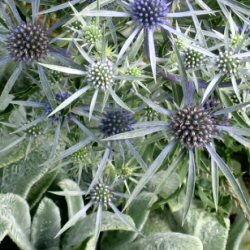
with: floriferous perennials including Solidago
with: Ornamental Grasses, gray-leaved plants
near: Achillea 'Coronation Gold' or the shorter 'Moonshine'
near: Lythrum, if you still grow Loosestrife
near: silvery-leaved Pulmonaria forms
beside: deep purple Veronica 'Sunny Border Blue'
behind: Oenothera macrocarpa, formerly O. missouriensis
a purple echo with: Lavandula 'Munstead', Nepeta x faassenii, Perovskia atriplicifolia
with: Thalictrum delavayi 'Hewitt's Double' & magenta Phlox paniculata
with: Hemerocallis (lemon yellow), Sidalcea malviflora 'Mr. Lindbergh'
with: ruby or rose-coloured Lilium, shrubby Potentilla
in front of: Centranthus ruber, Heliopsis
beside: Malva moschata (white), Sedum spectabile 'Stardust', Lychnis coronaria 'Alba'
Eryngium 'Blue Steel': 24"
note: multi-branched variety, very spiky dark metallic-blue flowers
Eryngium alpinum: Alpine Sea Holly, 18-24"x8-10", largest flowering, showy form, gun-metal blue flowers in a soft feathery ruff
where: dry, hot sites, perennials borders, needs good deep soil
uses: will attract both bees and butterflies
with: plants with lilac-blue flowers and/or silvery foliage
accentuate its steely nature with: Iris sibirica 'Mrs Perry', Salvia 'May Night', Cynara cardunculus
Eryngium alpinum 'Amethyst': 24"
what: large violet-blue thistle cone-like flowers
Eryngium alpinum 'Holden Blue': 32"
what: a rare variety, stout stems carry large spiky flowers, which mature to intense metallic blue
Eryngium amethystinum: Amethyst Sea Holly, 24", flowers & stems stained a deep blue, late-flowering, one of the best blues
what: flowers later than most
uses: mid border position, as filler, well-drained sites
with: Solidago, Aster, Phlox paniculata, Ornamental Grasses
Eryngium bourgatii: an excellent small variety to 18", deeply cut leaves with silvery-white veins, silvery-purple flower heads
where: front of border
with: Centranthus ruber, Sedum spectabile 'Stardust' (blue-green foliage & white flowers)
beside: Perovskia atriplicifolia
Eryngium bourgatii 'Picos Blue': 20"
what: bright blue flowers with silver bracts, silver-veined leaves
Eryngium giganteum: Miss Willmott's Ghost, 36"x12", steel blue flowers with silvery grey bracts, heart-shaped foliage
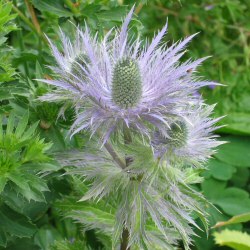
what: self-seeding biennial
where: well-drained sites, mid-border
amid: California poppy
with: Artemisia 'Powis Castle' (pale silvery-green ferny foliage)
with: Salvia 'Miss Indigo' (intense violet-blue)
with: Santolina (soft yellow button flowers)
with: Stachys byzantina 'Silver Carpet' (non-flowering)
Eryngium oliverianum: 24-40", wonderful but hard-to-find
what: large electric-blue flowers on upright stems, late summer
behind: Stachys byzantina 'Silver Carpet'
Eryngium planum: Plains Eryngo, Flat Sea Holly
Eryngium planum 'Blaukappe': 'Blue Cap', to 36"x18", toothed dark green foliage, metallic-blue flower heads with silvery ruffs
where: rear of border position
with: giant grasses i.e. Stipa gigantea, Stipa tenuissima
with tall perennials: Perovskia 'Blue Spire', Crambe maritima
with: Stachys byzantina 'Silver Carpet', Euphorbia characias spp. wulfenii 'Blue Wonder', Sedum spectabile
Eryngium planum 'Blue Dwarf': 'Blue Dwarf' Plains Eryngo, to 20"has: intense blue flowers
Eryngium planum 'Fluella': 'Fluella' Plains Eryngo
Eryngium planum 'Tetra Blau': 'Tetra Blue' Plains Eryngo, 24"
what: blue-grey flowerheads surrounded by blue-green bracts
note: a new tetraploid form of the species, genetically modified to enlarge the flowerheads for the cut flower trade
Eryngium proteiflorum: 24"x24", rarely offered, Zone 8 hardy
what: large silver spiny flowers
Eryngium serbicum: 24"
what: large dark blue flowers, sombre as well as sophisticated
Eryngium serra: 36-72", green, thimble-like blooms
what: long, leathery, spiny-toothed foliage, in rosettes, glossy
Eryngium x tripartitum: to 28", tiny violet-blue flowers
where: rear of border position
with: Phlox paniculata
Eryngium variifolium: Morrocan Sea Holly, small, 16-24"x10", spiny dark green white-veined foliage, metallic grey-blue flowers
where: prominent position, front of border, rock garden
with: Artemisia ludoviciana 'Silver Queen', Sedum 'Autumn Joy', Perovskia atriplicifolia 'Blue Spire'
Eryngium venustum: 16", foliage and flowers quite unlike any other form
what: long, deeply-lobed foliage in rosettes, greenish-white thumb-like flowers
Eryngium x zabelii: 24", a beautiful form with strong, upright stemswhat: large metallic blue flowerheads are 4" across
where: sunny, open, well-drained site
Eryngium x zabelii 'Forncett Ultra': 18"
what: compact variety, large spiky metallic-blue flowers and stems
Eryngium x zabelii 'Jewel': 24", double frilled bracts of steel blue surround flowerswhat: a strong and upright plant
Eryngium x zabelii 'Spring Hill Seedling': 24"
what: large deep blue heads and stems
Eryngium x zabelii 'Violetta': 32"
what: stunning violet-blue flowers and stems
GERANIUM
The Hardy Geranium, commonly called Cranesbill, can open up endless gardening possibilities. These plants are long-lived, returning year after year in true perennial fashion. They come in a variety of foliage forms, always attractive, dense, usually mound-shaped, sometimes deeply cut, some even changing colour in fall. Their 5-petalled flowers are best described as cup-shaped or saucer-shaped, from 1" to 2" across and come in shades of pink, magenta, white, purple, violet-blue or nearly black. They usually bloom from late spring to early summer, and some may even rebloom if plants are cut back.
Easy to grow, most are adapatable to a variety of cultural conditions. They can range from small alpines to groundcover forms, rock garden types to border specimens. Some grow best in full sun, some do better in partial shade. All seem to prefer evenly moist, well-drained soil, rich in organic matter such as compost or leaf mold. Best of all they seem to require little care to appear at their best. Nor are they bothered by pests or diseases. These are truly a special kind of plant that we would all be well-advised to grow in one form or another.
Everything you've ever wanted to know about this genus (and more) can be found in Birgitte Husted Bendtsen's recently published book, GARDENING WITH HARDY GERANIUMS. The 450 colour photographs of both flowers and foliage are magnificent. The text is highly readable and fact-filled. I bought this for myself for Chrismas of 2007 and can say it's undoubtedly one of the best gifts I've ever received. To find out more, follow the link to
Timber Press.
"KILLER-COMBO"
If you grow Hemerocallis or Daylily in your beds, you will want to plant these nearby for a perfect foliage and overall shape contrast. When the Geranium is at its peak, the daylily will be only emerging foliage. When the Geranium is finished and needs cutting back, the daylily will be building to its own peak period. During this time the Geranium will be sending up lush new foliage that will take over the show when the daylily starts to decline. What a perfect partnership! Thank you Marie for this wonderful idea.
There are many forms of Hardy Geranium to choose from. Find suitable companions for those listed below by following the links to other pages on our site where these species and cultivars reside.
Geranium: Cranesbill, pink & white
Geranium x cantabrigiense 'Biokovo': a natural hybrid selection with white flowers
Geranium cinereum spp. subcaulescens 'Ballerina': Grayleaf Cranesbill, 6" pink, maroon veins, darker centre
Geranium cinereum 'Laurence Flatman': deep pink with dark crimson veining
Geranium clarkei 'Kashmir White': Clarke's Cranesbill, pure white veined with lilac
Geranium endressii: pink Endres Cranesbill (Border Type)
Geranium endressii 'Wargrave Pink': Endres Cranesbill, warm salmon-pink
Geranium magnificum: Showy Geranium, blue-violet
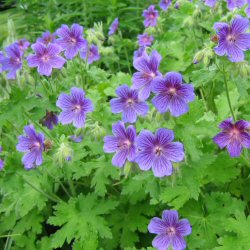
this wonderful species is seen in the border around this page and the images at the top of the page and directly above
Geranium phaeum: Mourning Widow (Border Type), 18-24"x24"
Geranium pratense 'Mrs. Kendall Clark': soft blue
Geranium renardii: 12"x12", sage green foliage, lovely texture, white flowers with violet stripes
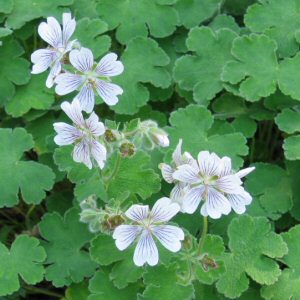
where: more than other species within the genus it prefers excellent drainage and lean soil
the soft foliage of this species simply cries out to be touched
Geranium sanguineum: Bloody Cranesbill
between: Astilbe & Viola cornuta
between: Primula polyanthes & Viola cornuta
Geranium sanguineum 'Album': Blood-red Cranesbill, white forms
Geranium sanguineum 'John Elsley': 8", bright pink
Geranium sanguineum 'Lancastriense': Alpine
Geranium sanguineum striatum: pale pink, deep rose veins, an Alpine type, 12"
Geranium x 'Johnson's Blue': lavender-blue
To find more about this genus, more images as well as partnership ideas just follow the links below.
MAZUS
 I called this tiny perennial "little purple thing" for several years before I was able to identify it. Its ground-hugging mat-like foliage is perfect during three seasons in my shady areas. Its snapdragon-like tiny purple flowers spotted with yellow add extra interest during their early period of bloom. Always late to appear in spring, Mazus forces me to delay tidying up its area until it emerges, but it's well worth the wait. There is even a white-flowered cultivar, Mazus reptans 'Alba', whose flowers are described as "orchid-like" and is reputed to be able to tolerate more sun than the purple-flowered form. Wouldn't a bright white serve to draw the eye to a dark shaded area! Rest assured I'll be checking this one out. It sounds lovely. And deer-resistant too - yet another bonus.
I called this tiny perennial "little purple thing" for several years before I was able to identify it. Its ground-hugging mat-like foliage is perfect during three seasons in my shady areas. Its snapdragon-like tiny purple flowers spotted with yellow add extra interest during their early period of bloom. Always late to appear in spring, Mazus forces me to delay tidying up its area until it emerges, but it's well worth the wait. There is even a white-flowered cultivar, Mazus reptans 'Alba', whose flowers are described as "orchid-like" and is reputed to be able to tolerate more sun than the purple-flowered form. Wouldn't a bright white serve to draw the eye to a dark shaded area! Rest assured I'll be checking this one out. It sounds lovely. And deer-resistant too - yet another bonus.
Mazus reptans: 2-4"x12"
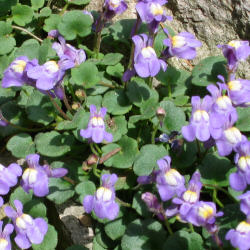
where: between patio stones, waterside, moist well-drained soil
valuable in: dry shade as well where it thrives for me under our many cedar trees
with: Carex glauca (Blue Sedge)
over: Lilium or other bulbs to shade their roots
PLATYCODON
 Hardy to Zone 3, Balloon Flower provides interesting blooms from early to mid-summer. The plant's blue-green, oval to lance-shaped leaves provide additional interest. Flowers can be used for fresh flower arrangments and are best picked when at least 2 buds have opened. The stems exude a white, milky latex so, for best results, the ends should be seared with a match before conditioning overnight in warm water.
In the garden these plants are mostly pest and disease-free and require little care. Mulch to control weeds, keeping the mulch well away from plant crowns. Deadhead to prolong the bloom season. Plants will benefit from an annual feeding, either top-dressing in spring with compost or through use of a balanced organic fertilizer. Foliage turns a good yellow colour in the fall. Foliage can be cut to the ground in fall after a hard frost or be left until spring to help locate late emerging plants.
And, just for the fun of it, who can resist "popping" the balloon-like buds of this special plant.
Platycodon grandiflorus: Balloon Flower
Hardy to Zone 3, Balloon Flower provides interesting blooms from early to mid-summer. The plant's blue-green, oval to lance-shaped leaves provide additional interest. Flowers can be used for fresh flower arrangments and are best picked when at least 2 buds have opened. The stems exude a white, milky latex so, for best results, the ends should be seared with a match before conditioning overnight in warm water.
In the garden these plants are mostly pest and disease-free and require little care. Mulch to control weeds, keeping the mulch well away from plant crowns. Deadhead to prolong the bloom season. Plants will benefit from an annual feeding, either top-dressing in spring with compost or through use of a balanced organic fertilizer. Foliage turns a good yellow colour in the fall. Foliage can be cut to the ground in fall after a hard frost or be left until spring to help locate late emerging plants.
And, just for the fun of it, who can resist "popping" the balloon-like buds of this special plant.
Platycodon grandiflorus: Balloon Flower
over: Crocus or other small bulbs, to guard against cutting into the plant which is slow to emerge in spring
planted over: spring-blooming Iris reticulata, including the brilliant blue cultivar 'Harmony'
beside: tall Digitalis, Paeonia lactiflora
in front of: tall Alcea forms, Anchusa
with: Ornamental Grasses
with: summer-blooming perennials, foliage to set off bright blue or pink flowers
with: Goniolinum tartaricum (German Statice) or Limonium latifolium (Sea Lavender, Statice)
with silver-foliaged perennials: Stachys byzantina, Artemisia
with: Allium, Salvia x superba, Nepeta x faassinii, Hemerocallis, Coreopsis verticillata esp. 'Moonbeam'
with: Perovskia atriplicifolia (now Perovskia x superba), Phlox paniculata or Phlox maculata
with: Solidago canadensis, tall Veronica spp. including 'Crater Lake Blue'
fall colour combo with: Bergenia & Lysimachia clethroides
with: Achillea 'Moonshine', Achillea filipendulina, Lysimachia clethroides, Monarda didyma
Follow the links below for more information about and partnership ideas for the Platycodon genus.
blue Balloon Flower forms
pink Balloon Flower forms
purple Balloon Flower forms
white Balloon Flower forms
SAXIFRAGA
The Rockfoil genus is a large and varied one, the best known form perhaps being Saxifraga x urbium 'London Pride'. Why limit yourself to one only - try other forms such as those below. There are many from which to choose. Propagate by seed in autumn or rooted offsets in winter. Pronunciation of the botanical Latin name is sax-iff-ruh-guh. According to the American Horticultural Society ENCYCLOPEDIA OF GARDEN PLANTS, this genus can be divided into 4 MAIN GROUPS for cultivation purposes. Knowing which group your own plants are in will help you grow them better.
- need both protection from mid-day sun and moist soil
- need both semi-shade and well-drained soil
- need well-drained rock pockets, alpine house pans as well as shade from mid-day sun, form tight cushions with early flowers
- need full sun and well-drained alkaline soil, foliage usually lime-encrusted
Saxifraga: unspecified forms
where: rock gardens, alpine gardens, cool locations
with: Cerastium tomentosum (white edger)
Saxifraga: white
with: Geranium cinereum 'Ballerina' or 'Laurence Flatman'
with: Scabiosa columbaria 'Blue Butterfly' or 'Pink Mist'
Saxifraga x arendsii: Mossy Saxifrage
where: walls, troughs, shady rock garden
Saxifraga cotyledon: Pyramidal Saxifrage, group 2
Saxifraga paniculata: Encrusted Saxifrage, group 4
where: walls, edger; sun to part shade
Saxifraga primuloides: a miniature variety
Saxifraga stolonifera: Strawberry Geranium, group 1
where: groundcover under flowering shrubs or small trees; shaded gardens; pots
with: Hosta, bulbs, wildflowers, ferns
Saxifraga x urbium: London Pride, group 1
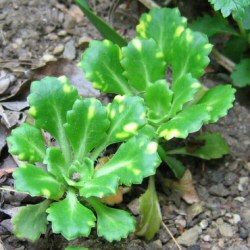
formerly: Saxifraga umbrosa
uses: as groundcover, as edger in shade, in dense shade under trees
All of our own Gardens By The Bay pages can be accessed by clicking on the links below.
HOME
GARDEN POETRY |
GARDEN POETRY MUSE
GEORGIAN BAY VIEW
BOTANICAL LATIN - BASICS
COLOR THEORY
THE GARDENS
CORNER GARDEN CONSTRUCTION |
CORNER GARDEN PLANTING |
LONG GARDEN
EAST GARDEN |
HOSTA GARDEN |
NORTH GARDEN |
WINTER GARDENS
PLANT PARTNERSHIPS
BLUE PERENNIALS Aconitum -
Geranium |
Iris - Vinca
BULBS Allium - Hyacinthus |
Narcissus only |
Tulipa only |
Minor Bulbs
BUTTERFLY MAGNETS Anaphalis - Hemerocallis |
Liatris - Veronicastrum
 DAYLILIES Spider & Unusual Form DAYLILIES Spider & Unusual Form EDGERS Arabis - Iris |
Nepeta - Veronica
FOLIAGE PERENNIALS
Alchemilla - Tanacetum
HOSTA Hosta - all
HUMMINGBIRD-FRIENDLY PERENNIALS Alcea - Salvia
ORANGE PERENNIALS Achillea - Tulipa
ORNAMENTAL GRASSES Acorus - Imperata |
Miscanthus - Spodiopogon
PINK PERENNIALS Achillea - Lilium |
Lychnis - Veronica
PURPLE PERENNIALS Aconitum - Liatris |
Polemonium - Veronica
RED PERENNIALS Achillea - Veronica
SHADE PERENNIALS Aegopodium - Erythronium |
Ferns - Polemonium |
Polygonatum - Vinca
SILVER FOLIAGE PERENNIALS
Achillea - Cerastium
|
Cornus - Limonium
|
Lunaria - Veronica
SIMPLY SPECIAL PERENNIALS Acanthus - Saxifraga
WHITE PERENNIALS Achillea - Iris |
Kalimeris - Yucca
YELLOW PERENNIALS Achillea - Hypericum |
Inula - Verbascum
VARIEGATED-FOLIAGE PERENNIALS Acorus - Erythronium |
Hakonechloa - Lysimachia |
Miscanthus - Yucca
PLANT PROFILES
Dianthus 'Tiny Rubies' |
Geranium |
Geum coccineum |
Kerria japonica |
Knautia macedonica
Paeonia tenuifolia |
Papaver somniferum |
Rudbeckia |
Salvia 'East Friesland'
Trollius |
Veronica 'Sunny Border Blue'
PROPAGATION
DIVISION - SPRING ONLY |
DIVISION - FALL ONLY |
DIVISION - SPRING OR FALL |
DO NOT DIVIDE
FERTILIZATION
EDGERS Arabis - Iris |
Nepeta - Veronica
FOLIAGE PERENNIALS
Alchemilla - Tanacetum
HOSTA Hosta - all
HUMMINGBIRD-FRIENDLY PERENNIALS Alcea - Salvia
ORANGE PERENNIALS Achillea - Tulipa
ORNAMENTAL GRASSES Acorus - Imperata |
Miscanthus - Spodiopogon
PINK PERENNIALS Achillea - Lilium |
Lychnis - Veronica
PURPLE PERENNIALS Aconitum - Liatris |
Polemonium - Veronica
RED PERENNIALS Achillea - Veronica
SHADE PERENNIALS Aegopodium - Erythronium |
Ferns - Polemonium |
Polygonatum - Vinca
SILVER FOLIAGE PERENNIALS
Achillea - Cerastium
|
Cornus - Limonium
|
Lunaria - Veronica
SIMPLY SPECIAL PERENNIALS Acanthus - Saxifraga
WHITE PERENNIALS Achillea - Iris |
Kalimeris - Yucca
YELLOW PERENNIALS Achillea - Hypericum |
Inula - Verbascum
VARIEGATED-FOLIAGE PERENNIALS Acorus - Erythronium |
Hakonechloa - Lysimachia |
Miscanthus - Yucca
PLANT PROFILES
Dianthus 'Tiny Rubies' |
Geranium |
Geum coccineum |
Kerria japonica |
Knautia macedonica
Paeonia tenuifolia |
Papaver somniferum |
Rudbeckia |
Salvia 'East Friesland'
Trollius |
Veronica 'Sunny Border Blue'
PROPAGATION
DIVISION - SPRING ONLY |
DIVISION - FALL ONLY |
DIVISION - SPRING OR FALL |
DO NOT DIVIDE
FERTILIZATION
BULBS |
ORNAMENTAL GRASSES |
PERENNIALS |
SHRUBS |
VINES
LINKS
GARDENS |
LOCAL GARDENS |
BOTANICAL TERMINOLOGY
GARDENING BOOKS |
NON-GARDENING
HOME
|